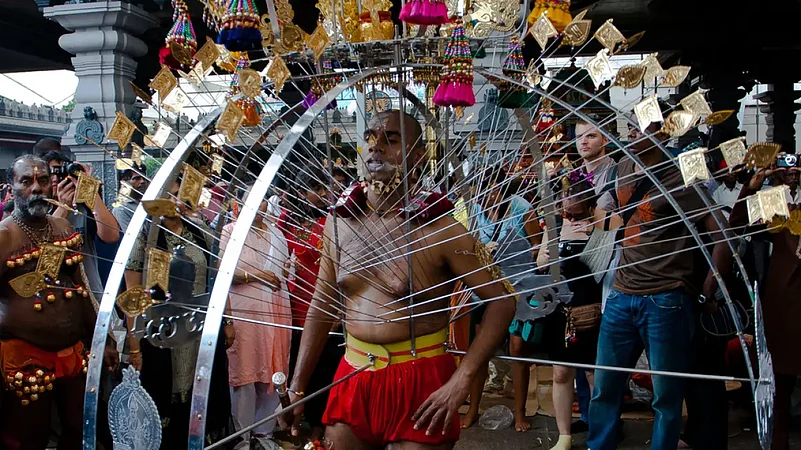Known as the ‘Land of Festivals’ to the world, India has a large number of them and countless indigenous and obscure in nature. Diwali boasts its oil lamps and fireworks while Holi manages to colour every soul it comes in contact with. Apart from the festivals that define Indian ethos, there are many local festivals that are unconventional in nature—one such local festival is the Tamil Hindu’s Thaipusam, celebrated not only in India but is also a significant Hindu festival in Malaysia and Singapore.

Celebrated in the month of January each year, Thaipusam is a Hindu festival that celebrates the conquering of good over evil. It is also known as the ‘festival of the tenth moon’ since the word Thaipusam breaks down to ‘Thai’, meaning ‘ten’ and ‘Pusam’, meaning ‘full moon day’ or ‘Purnima’. On this auspicious day, people believe in doing penance and worshipping Lord Murugan, the god of war. It is believed that the devotees shall lose their arrogance, hatred, and greed in doing so.
History of Thaipusam:
The origins of this festival can be traced back to ancient Hindu texts. Murugan was fighting a brutal demon named Soopradaman who had managed to take over all three realms: heaven, earth and hell. It was a grave situation since he had taken all the gods hostage. Three demons were torturing the entire universe excruciatingly. They were tropes for hatred, greed and arrogance.
That was when Murugan was given an orb by his mother, goddess Parvati that contained the power of the almighty Parvati. Lord Murugan defeated the three demons and restored peace and tranquillity in the universe with the help of the sphere.

Thaipusam celebrations:
The celebrations of this festival are associated with penance and might appear gruesome but they sure are intriguing. Usual celebrations involve offering yellow and orange-coloured fruits and flowers at Lord Murugan’s temple since these two colours are believed to be his favourite. A bamboo stick adorned with cloth and peacock feathers, with two pots tied at either end are carried by devotees. This is called ‘Kavadi’, a symbol of Lord Murugan’s vehicle. These pots are either filled with milk or fruits and flowers. Many devotees are also known to shave their heads on the occasion.

An extreme form of penance is displayed in the form of bodily mortifications, where the devotees pierce their skin, tongue or cheeks with a skewer that is a symbolic spear or ‘Vel’. This is done to impede speech and then attain concentration on the Lord. A stringent physical and mental discipline is maintained throughout, along with purification of the body via meticulous fasting and observing celibacy. Devotees are also found pulling chariots and other heavy objects with hooks sunken in their flesh!





















